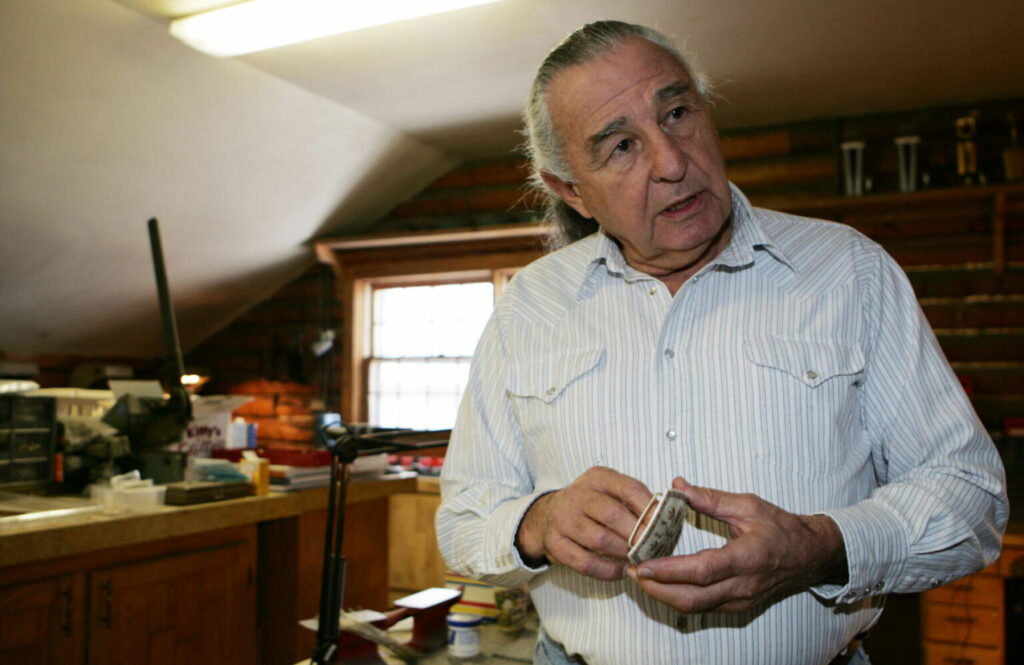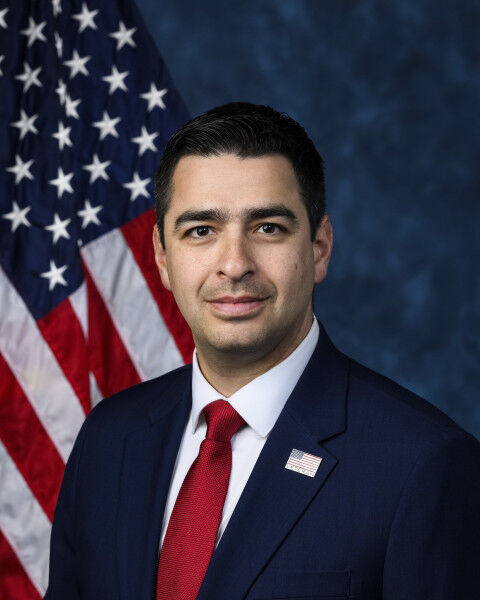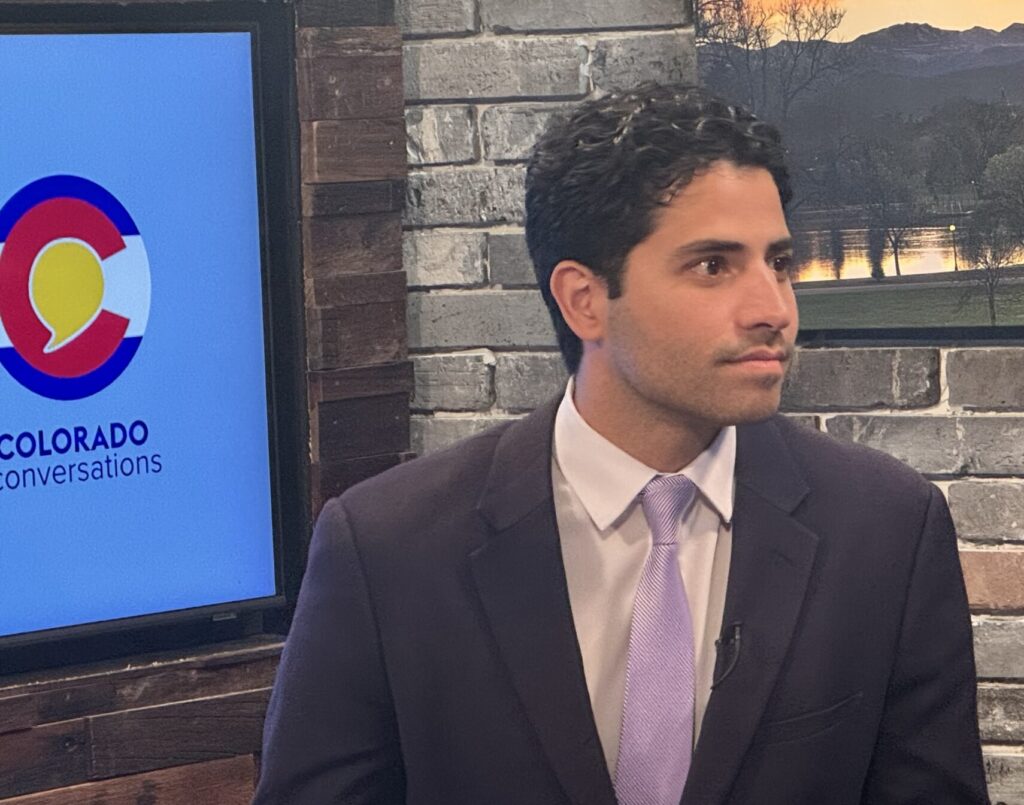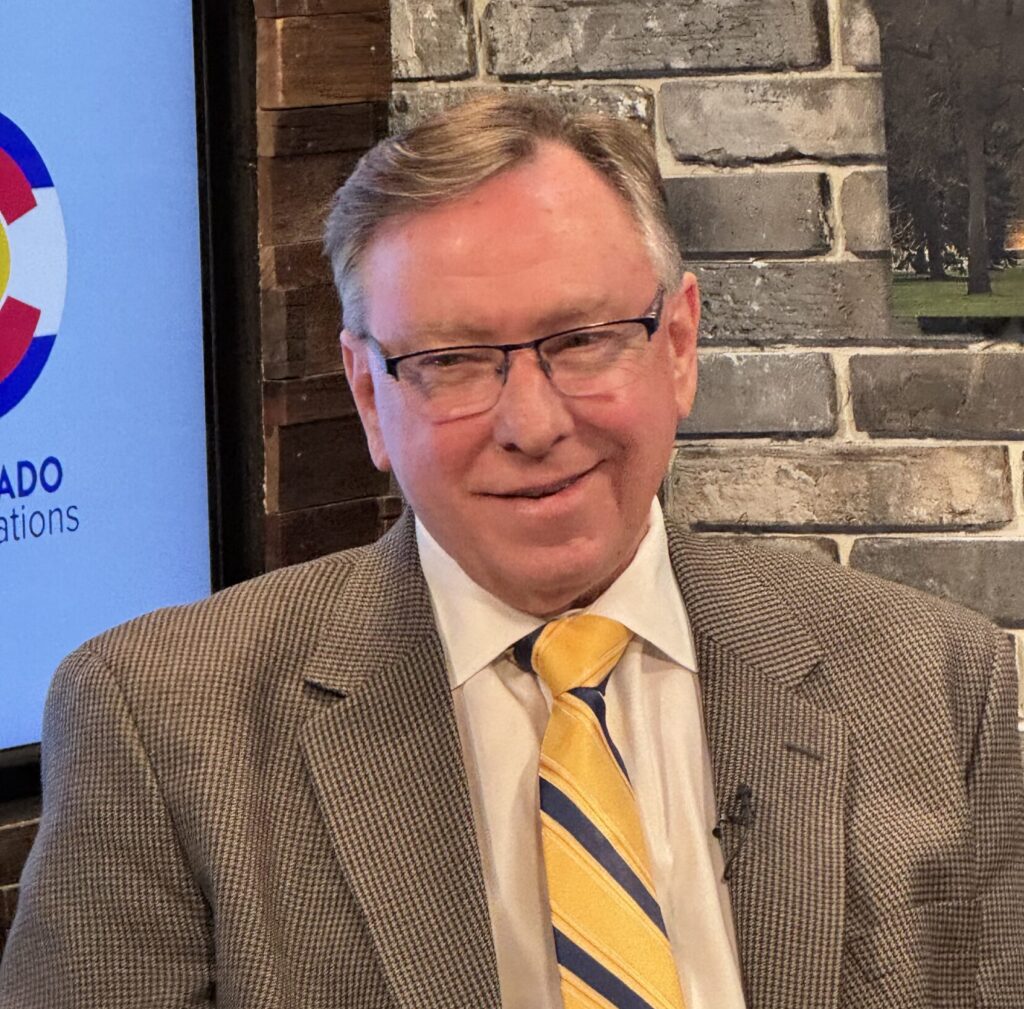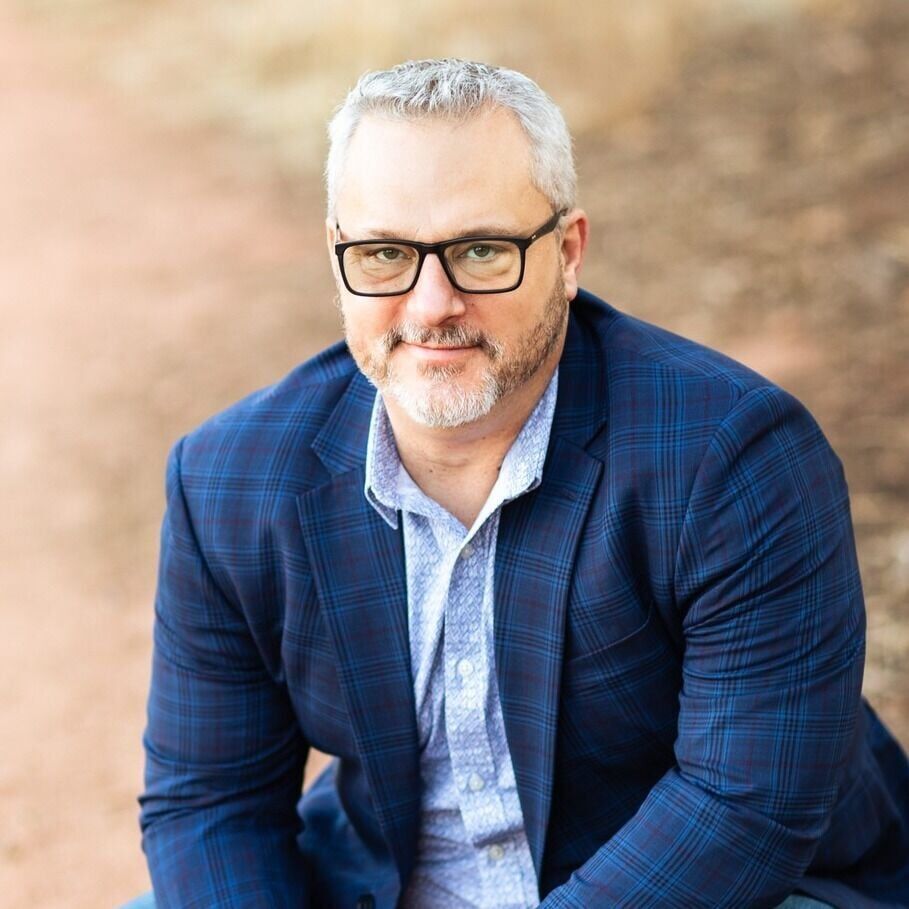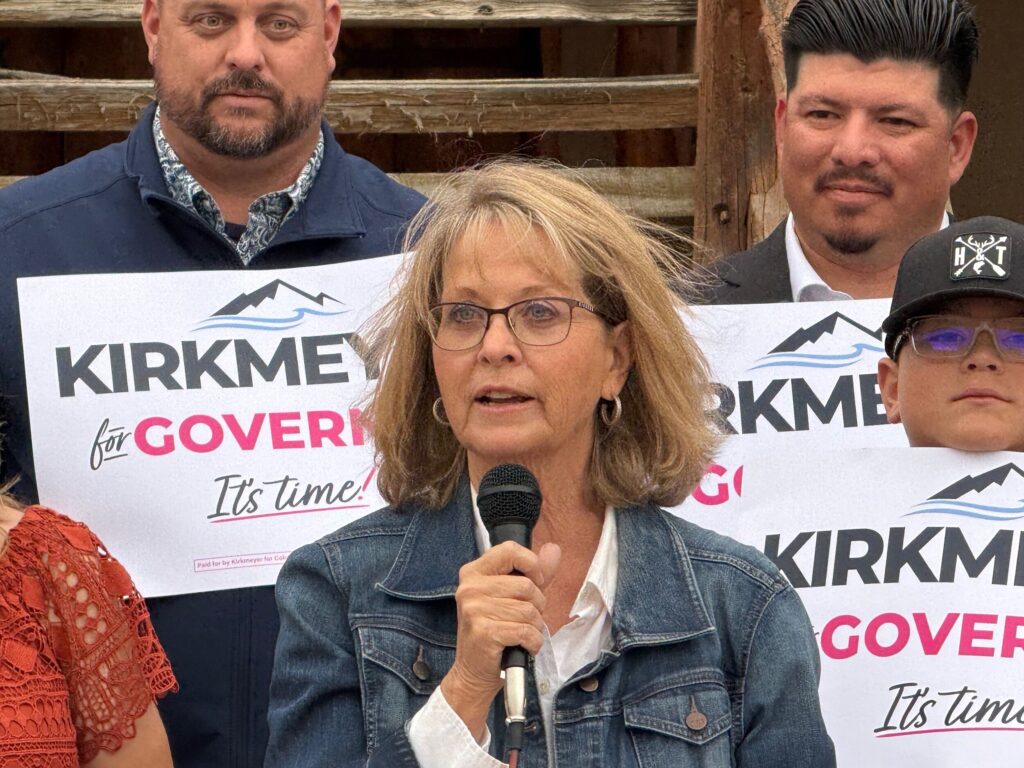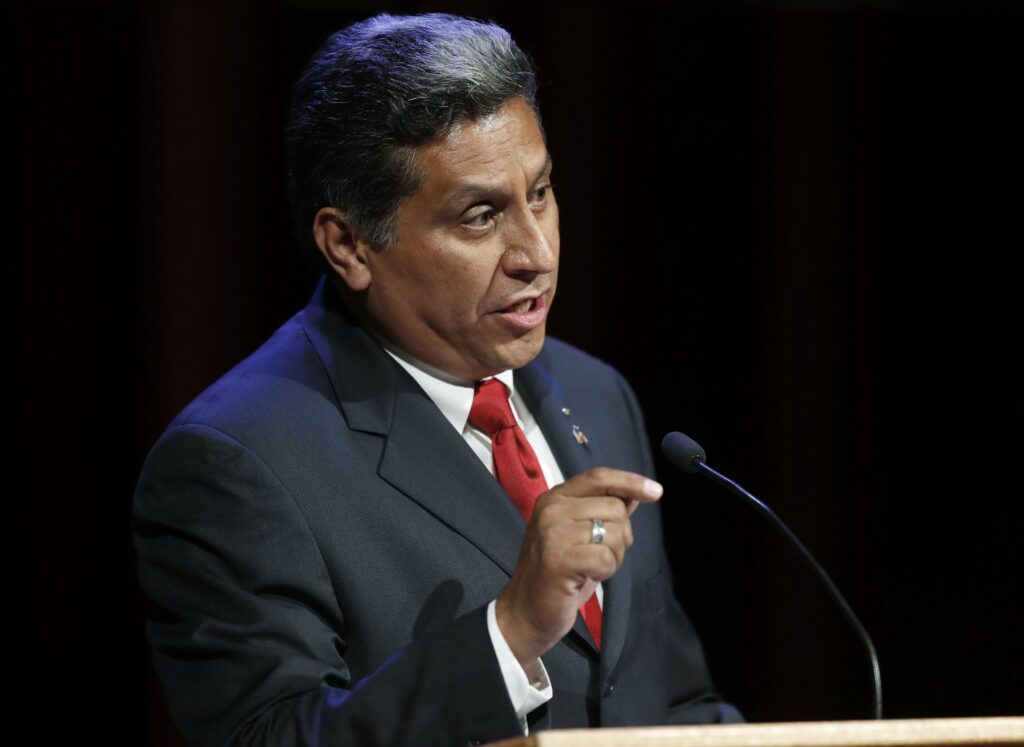Dave Williams says Colorado GOP won’t apologize for beliefs, wants to close primaries | COVER STORY

As Dave Williams takes the reins of the beleaguered Colorado Republican Party, the former three-term state lawmaker from Colorado Springs says to expect a more confrontational posture from the party but cautions that it could take more than one general election cycle before the GOP regains power in the state.
The pugnacious 36-year-old – Williams sued to appear on ballots last year with an anti-Biden slur attached to his name and filed a criminal complaint against the incumbent congressman he challenged in a primary – told Colorado Politics in an interview that anyone who thought he’d trim his sails or tack toward the middle after winning the party chair race earlier this month will be disappointed.
Williams said he intends to charge ahead with plans to block unaffiliated voters from participating in Republican primaries. He also wants Tina Peters, the indicted former county clerk who goes on trial this summer on charges stemming from allegations she helped tamper with election equipment, to take an official role with the state party, dismissing critics who suggest the unsubstantiated rigged-election claims she promotes damage Republicans’ chances in Colorado.
“We’re going on offense,” Williams said. “We’re going to take the fight to the Democrats every chance we get, and we’re no longer going to apologize for our beliefs or values, but we’re going to boldly articulate them in the marketplace and stand firm to what we believe on.”
Republicans, who haven’t won a statewide election in Colorado since 2016, have also steadily lost seats over the same period in the General Assembly and in the state’s congressional delegation. While both major parties’ share of the state’s registered voters have dropped in the last decade – from just over 31% of the total each in 2013 – Republicans have fallen to about 24%, with the Democrats accounting for about 27%. Other than a small fraction belonging to third parties, the remainder – nearly 47% of the total – are unaffiliated voters.
Williams won the GOP’s top job on March 11 at a state central committee meeting in Loveland.
Prevailing in a field of seven state chair candidates just weeks after announcing his candidacy, Williams defeated former congressional candidate Erik Aadland in the third round of voting after two of his rivals – Peters and former state Sen. Kevin Lundberg – withdrew and threw their support behind him. The other chair hopefuls – three-time congressional nominee Casper Stockham, former Mesa County GOP chair Kevin McCarney and grassroots organizer Aaron Wood – also dropped out before the final round.
Williams takes over leadership of the state party from Kristi Burton Brown, an attorney, who announced late last year that she wasn’t seeking a second two-year term, guaranteeing that Colorado Republicans would elect their sixth chair in as many terms.
‘What the voters care about’
Speaking while driving home from the Eastern Plains, after attending back-to-back county GOP Lincoln Day dinners in Holyoke and Yuma, Williams said he’s taking some time with the transition and is concentrating on honing the party’s message while assembling a team.
He said a first priority is to move away from the branding scheme Burton Brown developed for Republican candidates in the last election cycle, a set of principles dubbed the “Commitment to Colorado.”
“The different approach that we’re taking is that we’re really going to nail down what the voters care about,” Williams said. “If you notice in the Commitment to Colorado, you had those 10 points but it kind of zeroed in on three things – it was cost of living, crime and educational choice.”
Burton Brown unveiled the set of policy prescriptions more than a year before the 2022 election at a gas station in Denver, alongside legislators and representatives from conservatives groups that helped craft them, and then hammered the points throughout the campaign.
“What I’d like to do, instead, is I’d like to really zero in on the three or four issues that voters – not only Republicans but also swing voters – actually care about,” Williams said. “If you look at what the Democrats are doing, they talk about health care – great, great issue that I think most voters are really concerned about. Whether it’s dealing with affordability or accessibility, voters want the government to tackle these issues and make sure that they’re getting the care that they need at a reasonable price.
“I think if we engage the voters on what they care about most, while demonstrating that Democrats are not actually going to solve those problems, we’re going to make some gains.”
He expressed some admiration for the audacity of Gov. Jared Polis, the Democrat who cruised to reelection last fall by an overwhelming margin, for creating a department in his administration called the Office of Saving People Money on Health Care.
“Like him or not, he’s addressing the concerns that most Coloradans are wanting the government to tackle,” Williams said. “He’s doing it from a perspective that Republicans would disagree with and, ultimately, we think, will drive up costs and lessen accessibility, but nevertheless, he’s marketing towards that. In that same way, we need to be about those issues. And I think we have a better opportunity to to learn what that is and not go into it with our own preconceived notions.”
Williams said he wants to “invest some money into polling or focus groups and kind of nail down what that is with swing voters, but I imagine it’s going to be healthcare and I imagine it’s going to be crime – especially now that we’re seeing more and more of it become an issue, especially in that Denver metro area.”
He added, “The thing that I think is so exciting about taking that approach is that we don’t necessarily have to be something that we’re not. One of the reasons why Republican candidates of the past have lost is, I think, they try to be all things to all people. Instead of taking that approach, we should simply figure out what those issues are and align ourselves with solving those issues.”
One opportunity to draw distinctions with the ruling Democrats, he noted, is during the legislative session, where Republican lawmakers have stood in opposition to several of the majority party’s signature issues, including staging a late-night filibuster on a gun-control bill.
Williams didn’t seek reelection to a fourth term in the state House of Representatives last year – instead mounting an unsuccessful primary challenge against U.S. Rep. Doug Lamborn, who won reelection in November to a ninth term – but he has been working as an aide to several legislators this session, a job, he said, he plans to keep for a while.
“We’re going to figure out how to make sure we maintain a good balance with respect to fulfilling those duties, as well as being a party chair,” he said. “But I want to be involved in in that environment so that we’re responding in real time to some of the really serious concerns we have that the Democrats are trying to pass with their radical agenda.”
He cited upcoming debate on a slate of abortion-rights bills as a prime opportunity to demonstrate differences between the parties.
“Absolutely,” he said. “Those are definitely big, major ticket items we’re going to be fighting off, that the Republicans are not gonna just lay down on on any of those issues.”
Tina Peters welcomed aboard
He’s also been busy welcoming the other chair candidates to join him in shaping the party for the coming years.
“It’s still work in progress,” Williams said. “A number of them have responded to my invitation to have some sort of formal role. The details and the job responsibilities have not been finalized yet, but they will be as soon as we can.”
Added Williams: “We’re not going lightning fast on these things, but we’re making progress each and every day. It comes down to, how do the other candidates feel? What did they envision? What did they feel like they can contribute, and how do we plug them in?”
Peters, Lundberg and Wood have agreed to take on roles, Williams said, while the other three – Aadland, Stockham and McCarney – told Colorado Politics that they’ve decided to pass on the offer.
“Sure, I will work with him on whatever projects he needs me to do and I have the time to accomplish,” Lundberg said in a text message.
He said that it’s up to Williams to determine what his participation might look like and added that they’ve discussed a couple possibilities but haven’t finalized anything.
Aadland told Colorado Politics that he wishes Williams the best but is taking a job as an executive for business development in the tech sector.
Stockham, for his part, said in an email that he’s giving up on politics entirely and has closed down the candidate training organization he founded several years ago.
“I am going back to the life I had before politics,” Stockham said, adding that he and his wife are busy with a coaching enterprise and a podcast devoted to encouraging healthy relationships, “[a]long with some other great projects that are NOT connected with politics.”
Stockham said he’s hanging up his political spurs after becoming convinced that “[n]o one in power wants to do the right thing to help people,” adding, “10 years is long enough to try and change the game.”
Williams said it’s important “for unity’s sake” to bring aboard the chair candidates that want to help.
“There are a number of folks who had their favorite candidates in that race,” he said. “And we want to be making sure that everyone’s on the same team and headed in the same direction. And I think it’s going to be a big boost in terms of unity. No matter what side of that race you came in on, we’re all going to put forward a unified front and bring all of our strengths and talents to bear.”
He said he isn’t worried about naysayers who urge keeping Peters at arm’s length.
“We have to understand that we can’t win without each other,” he said. “You know, I’m not going to banish people out of the party. And let’s be honest, the media, the press, they’re still going to write about Tina. It’s not like I can run away from from what others are going to say. So, I’d rather utilize her time, energy and talents for the benefit of our party.
“Regardless of what others may think, Tina is still a person of stature within our party,” he continued. “There are tons of people, whether they’re on the Front Range or on the Eastern Plains or the Western Slope, that still revere Tina and still want to be a part of what she’s doing. So, I’m not going to turn our back on Tina. She wants to contribute and help us win. I’m going to welcome it because, truth be told, we can’t win without everyone pitching in.”
Like Williams, Peters said during the chair race that she believes former President Donald Trump won the 2020 election, despite overwhelming evidence that Joe Biden won. She has pleaded not guilty to seven felony and four misdemeanor charges brought last year by a Mesa County grand jury on allegations surrounding what prosecutors called a “deceptive scheme” to breach her county’s secure voting equipment.
Although Peters admits she helped others make an unauthorized digital copy of the voting system, she insists she did nothing wrong and blames political opponents for the criminal charges.
Peters didn’t respond to a request for comment on a possible position with the state party, but Williams pointed to her fundraising prowess – she raised more than $500,000 in a matter of days to pay for a statewide recount after she lost last year’s primary for secretary of state by a wide margin – as a possible element in her contribution.
“Tina has proven that she can encourage folks to donate and, I think, if that’s something that she wants to do, I will welcome it,” he said.
The state GOP could be embarking on some high-dollar fundraising in the near future if the party obtains a favorable ruling from the Federal Election Commission that would allow the party to participate in a lawsuit aimed at closing Colorado’s primary elections to unaffiliated voters.
Last year, a federal judge dismissed a lawsuit brought by a handful of Republicans – including Stockham – to overturn the state law establishing semi-open primaries, which was approved by voters in 2016, because the party wasn’t involved in the lawsuit. According to the party’s attorney, Chris Murray, the FEC initially said the state party’s federal committee could only raise unlimited funds to defend against a lawsuit, but the party is arguing that, even though it would be plaintiff, it considers the the legal challenge a defensive move.
“The reason that we contend it’s a defensive lawsuit is because the open primary was foisted onto the party,” Williams said. “The party didn’t support it, and just because the voters voted for it doesn’t mean there aren’t serious First Amendment, freedom of association concerns that we have. So, we feel it’s a defensive measure, even though we’re going to be the plaintiffs. We’re just seeking clarity on that.”
Closing Colorado’s GOP primary
If the lawsuit succeeds in repealing the law, unaffiliated voters would be unable to vote in either major party’s primary.
Williams said the party plans to move ahead as quickly as possible with the complaint but will also consider a move that would only prevent unaffiliated voters from casting ballots in Republican primaries.
Under the 2016 ballot measure, the Democrats or Republicans’ central committees can vote to “opt out” of the semi-open primary and instead nominate candidates to the general election ballot under their own procedures. Williams led an effort to do just that two years ago, but the proposal fell well short of the required 75% majority.
He said he thinks the opt-out has a better chance of passing this year, adding that it will likely be considered at a Republicans meeting in September.
“I’m not not sure where the central committee will go, but there are a lot of people out there that want to do something different, and, ultimately, I think that will be reflected in the results,” he said, adding that the proposal will likely move in parallel with the lawsuit to overturn the primary system.
“I think they will end up going hand in hand, but to start we’re going to focus on the lawsuit and get that squared away because it’s been two years” since the initial lawsuit was filed, he said. “With respect to the opt out, I still think there’s merit to it, I still think it’s a good idea. But before I get involved in that, I want to make sure that we have a fair process set up so one can accuse the process of being unfair. I just want to make sure that when we have the debate, that it’s a fair debate, and that people can have confidence, knowing that I’m not tipping the scales one way or the other.”
Veteran GOP consultant Ryan Lynch, who doesn’t count himself as a fan of Williams, told Colorado Politics that it would be a disaster for Republicans up and down the ticket if the party succeeds in canceling the primary by either method.
He said that, if it’s the Republicans leading the charge to take away the right of unaffiliated voters to vote in a primary, those voters could punish the GOP as a result.
“The worst thing the incoming state chair could do is lead an effort to opt out of the primary,” Lynch said. “The damage that would do to the Republican Party in Colorado could last decades. Absent of that, there isn’t a ton of damage that the state party could do.”
Williams said one reason Republicans didn’t decide to go their own way and opt out of the primary two years ago was because the prospect of only nominating Republicans to the fall ballot through the caucus and assembly process would leave the decision to too few people – but that isn’t the only alternative.
“As long as we’re conforming with the state law, we can come up with many different ways to increase participation and access for all Republican voters, should they want it,” he said. “A big reason why the opt out vote failed two years ago was because of that very real concern that not nearly enough Republicans would be a part of the nomination process. I think if you’re going to see the opt out actually occur, then the supporters of the opt out are going to have to come up with a plan that allows for the maximum amount of participation possible.”
The Colorado GOP could adopt a method resembling the one the party uses in Virginia, where Republicans meet all over the state to vote on nominees, for instance, Williams said.
“It really comes down to logistics and fundraising. If we wanted to, as a party, just mail every registered Republican and say, ‘Hey, vote on our own ballot,’ we could do that. If we want to just create polling sites all over the state and bring them all back to one convention site where we count out the votes and then decide, ‘OK, these are our nominees,’ we could do that as well. It’s really only limited to our imagination and funding and logistics. So, there’s many different ways that we can skin this cat. It doesn’t have to be the caucus and assembly.”
A steep climb ahead
Whoever the party nominates next year, Williams acknowledged, the party likely won’t regain majorities in either chamber of the legislature, and there aren’t any statewide offices on the ballot in 2024 to take back from the Democrats.
Nonetheless, he said, Republicans will be able to measure whether his chairmanship has been a success.
“Certainly, winning is the ultimate benchmark, right?” he said. “If we flipped some of those seats that we lost and we show that we’re making gains in these regional areas, because there are no statewide elections other than presidential.”
Williams said winning the closely divided 8th Congressional District – a new seat gained ahead of last year’s election, Democrat Yadira Caraveo carried the race by less than 1 percentage point – and defending the 3rd Congressional District, where Republican Lauren Boebert won reelection by an even closer margin, will count as wins. He also ticked off several legislative seats he said the GOP hopes to win back in next year’s election, including state House districts in Douglas, Jefferson, Weld and El Paso counties.
“These are the seats that we have to absolutely recapture to really set our party back on the path to victory,” he said. “We’re not going to turn this around in one cycle.”
Williams said he’s taking a long view.
“I think, ultimately, success for the Republican Party is going to be a long-term endeavor, that it’s not going to be one cycle and then we’re back to par; it’s going to be several cycles of success that’s building off that success,” he said. “That’s my goal. I don’t think anyone expects us to retake the majority, but we’re definitely going to make our minority stronger in the state House and start to rebuild and set ourselves up for a good 2026. If we’re doing everything that we’re doing to demonstrate how Democrats are out of touch and crooked, then that should make our case easier to the voters, especially as Jared Polis moves on, and we don’t have to worry about him spending $30 million of his own money.”
Polis, who largely self-funded his two campaigns for governor, is term-limited in 2026, as are all the other statewide executive offices – secretary of state, attorney general and state treasurer – removing the advantages of incumbency across the board.
Williams said he’ll also focus on building the GOP’s bench over the next two years.
“I’m going to work with not only other party officers and committees around Colorado, but I’m also going to work with other ancillary, third-party groups to see who they have in mind,” he said. “If they’ve identified someone who’s good on the issues and can fit the profile of the communities they want to potentially represent, then we’re going to do everything we can to get them set up for success, should they decide to run.”
Williams said he plans to take a brief hiatus from wall-to-wall party duties at the end of March because his wife is due to give birth to their third child, a son.
In April, however, he’ll be back at it, putting the miles on to visit Lincoln Day dinners around the state and check in with county Republican parties.
He said he’s optimistic about the GOP’s prospects.
“I think that we’re poised for for a turnaround,” Williams said. “I know it seems kind of rough right now because Democrats certainly control everything, but I think we’re going to move forward and go up.”

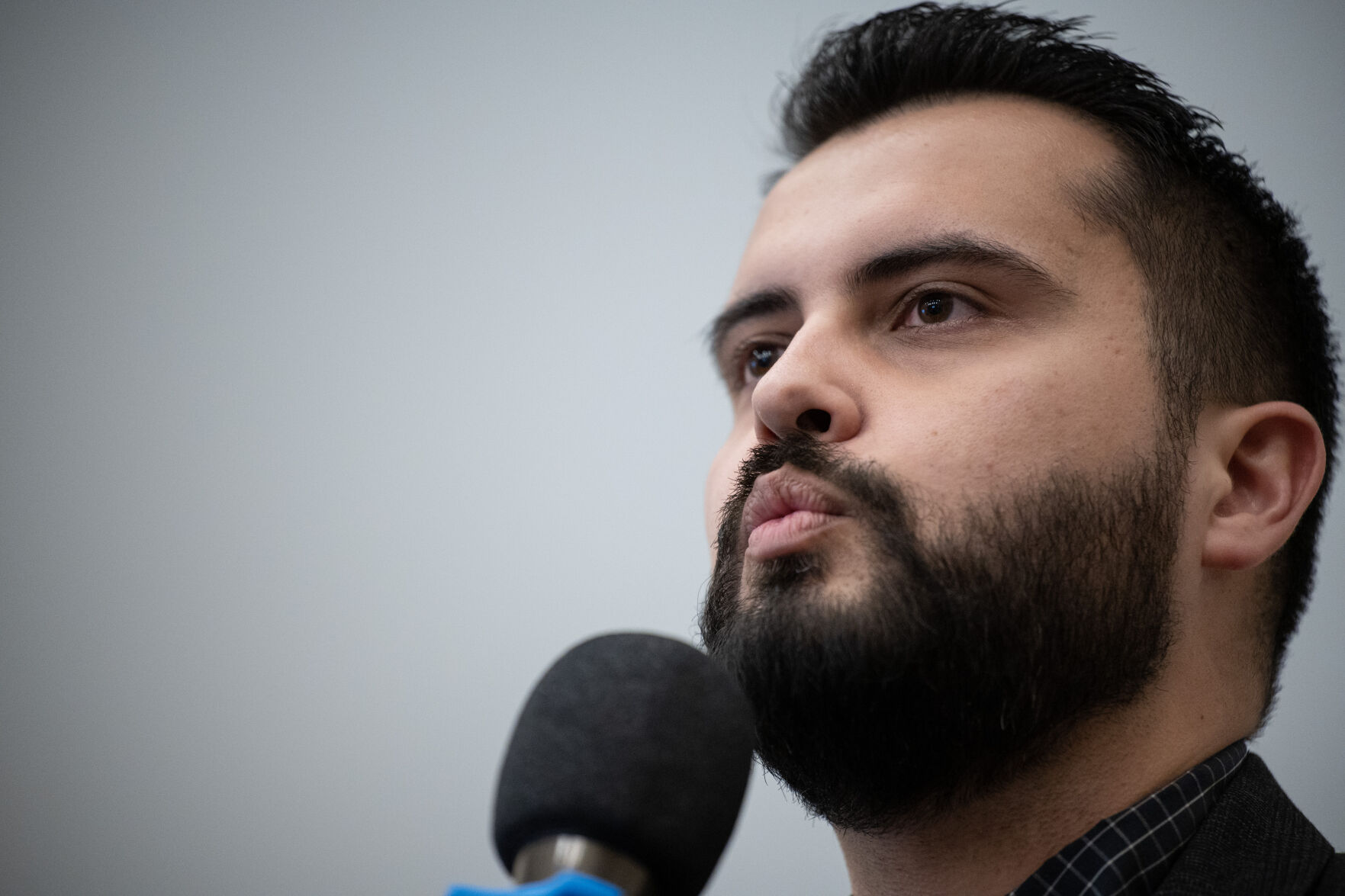

ernest.luning@coloradopolitics.com




